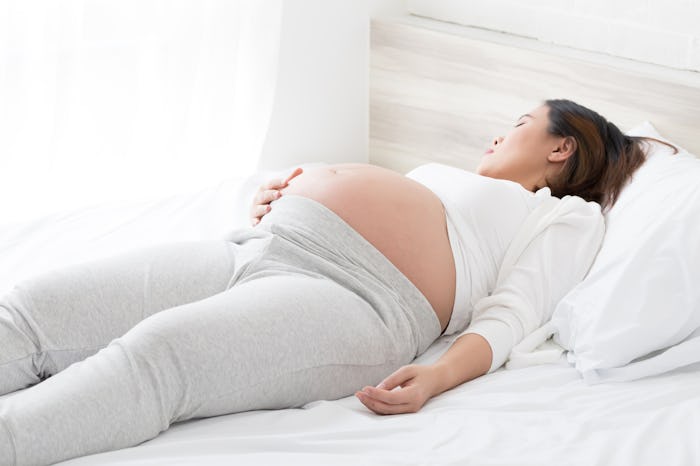Life

This Is Exactly What Happens To Your Body When You're Dehydrated During Pregnancy
When you're pregnant, every season brings its own medical challenges: allergies in the spring, flu in the fall, colds and pneumonia in the winter, and dehydration in the summer. When those warm weather months start rolling, gestating women have to be extra cautious about their exposure to the heat and sun. But exactly what happens to your body if you're pregnant and dehydrated?
According to Dr. Yvonne Bohn of Providence Saint John's Health Center in Santa Monica, the biggest risk may be the fact that dehydration carries the potential to start contractions. Bohn explains to Romper, “When a pregnant woman is dehydrated, the body will release an anti-diuretic hormone to help conserve fluid. This hormone has a similar structure to Oxytocin, so women can have uterine contractions stimulated by dehydration. It is risky if it leads to preterm birth."
The most common sign of dehydration is mild cramping. In fact, many women experience cramps throughout their entire pregnancy without realizing their bodies are simply trying to tell them to drink more water. And while more acute episodes of dehydration can be resolved with lots of electrolyte-packed drinks and good old R&R, occasionally the symptoms may be severe enough to warrant a trip to the hospital for an IV infusion.
In an interview with Romper, OB-GYN Dr. Neha Singh Rathod says the risks of severe dehydration in pregnancy include maternal complications such as low blood pressure, hypoglycemia, ketosis, and shock. According to Ratho, risks to the baby include poor growth, reduced weight as compared to gestational age, fetal distress, and sudden intrauterine death. Certainly nothing to play around with.
If you're able to drink and hold down fluids, you are most likely not at risk for severe dehydration and its pregnancy complications. In instances of light headedness, dark urine, and fatigue that may come from overextending a workout or too much time in the sun, Bohn says that home remedies should have you feeling better quickly. However, Bohn cautions, "in cases of severe dehydration from nausea, vomiting and diarrhea associated with food poisoning, the flu, or Hyperemesis Gravidarum, women need to go to the hospital for intravenous fluids if they are unable to hold fluids down."
Assess your condition and what your needs are, or have someone you love make the decision for you when deciding whether or not to head to the hospital. Although most instances of dehydration are relatively mild, if you have any doubts, its best to call your provider. After all, when it comes to your health and the health of your baby, it's better to be safe than sorry.